
200 year old children
June 10, 2014
“There are people alive today who will live to celebrate their 200th Birthday” some may say this claim is outlandish, but i think many in the medical research field would agree with the sentiment, but still may be little sceptical about the number 200years.
I do not believe that i will be among those to reach my 3rd century walking the planet, but i do think my children have every chance.
The decision they will have to make is that when a body part or organ falters, will they pay for a new
one to be tailor made and inserted. For example if they contract a condition like cancer of the liver, which would be a life ending for me in 2014, will in 2054, be the medical equivalent of replacing a blown tyre on you car.
Their new Liver will be exactly that, theirs, Bio-printed by a 3D organ printer using cultured stem cells taken from them. No rejection problem or other complications as the new liver will be identical to the one they had in thier early teen.
Matrix Medicine!
June 10, 2014
In the post-apocalyptic world that is so often portrayed by Hollywood, many things change.
Things we now take for granted and have no value today, are often perceived to have great value. As we move towards a world in which most common human pathogenic bacteria have evolved a defence against Antibiotics, due to misuse and over prescribing, these treatments will become ineffective and obsolete. It seems reasonable to me that Hollywood would postulate that substances that are rich in bacteria fighting, “Good Bugs” will become very valuable. One of the substances that if super rich in, disease fighting, good bacteria and is readily available is a health persons Poo! Is it possible that we will see this bodily product become valuable? After all we already have businesses dedicated to the purchase and collection of many other human products, like Blood, Sperm and Breast Milk.
A “Super Bug” is an Antibiotics resistant bacterium that causes disease and infection in humans. The number of Super Bugs is growing at an increasing rate. One of the most common is Clostridium difficile which is responsible for a staggering 14,000 deaths annually in the USA, and an estimated 1000 to 2000 in Australia. (clostridium difficile outbreaks are a reported event in USA but not in Australia) The most effective treatment available to Doctors is a Faecal transplant, this involves taking a sample of a Healthy Persons Poo and Diluting it in Saline solution or milk then using a nasal tube or colonscope to send the solution to the sick small ntestine.
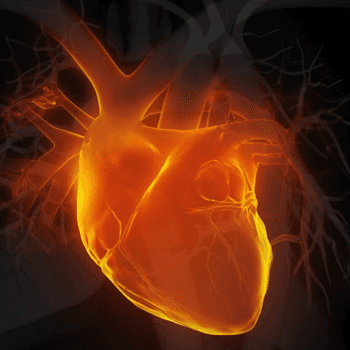
Aussie Heart Therapy Breakthrough
June 9, 2014
On average a little over 800 babies are born every day in Australia, of these 6 will have some kind of Congenital Heart Disease (CHO). Current surgery techniques mean most will survive only to require more surgery later in life, that is, until a new Australian technology current being trialed is widely adopted. Cardiocel is an implantable tissue technology derived from Cows that ensure a permanent repair.
The patch has been successfully implanted in 25 patients at the time of writing in 2014, and is likely to bring benefit to not only babies, but also to the 32,000 Australians under 18 years of age who are currently living with a CHO. The biggest single advantage of the patch is that it does not generate a post surgery immune response or allergic reaction in the recipient. Another is that the patch is adopted by the Patients heart as an undifferentiated segment of tissue that becomes a part of their heart. How is this possible?
The patch starts its life as a bi product of our meat processing industry in the form of the protective sack that surrounds the heart of a cow, known as the pericardium. The cells and all cows DNA is removed from this, in what is essentially a series of washes through various solutions. At the end of this process what remains is a collagen matrix that very closely resembles that of normal human tissue.
1. Damaged heart valve
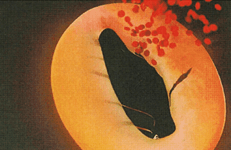
2. Patch is sewn on during open heart surgery
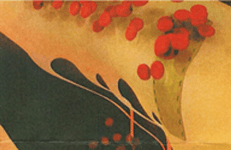
3. Blood vessels infiltrate the patch and deposit the same cells as surrounding tissue integrating it into the heart.
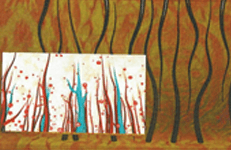
Autodidact
May 6, 2014
A friend of mine who also happens to be a Chemistry Professor once described me as an Autodidact. I had a look it up, and it means a self-taught person. While pondering upon this description, which i accept as being 70% accurate, I did my usual analysis of Positive, Negative and Interesting aspect of my non-existent educational credentials.
On the Positive side I realized that i do not use words that need to “looked up” by the listener if an alternate simpler and accurate description can be used. I also don’t suffer from academic discipline myopia, that is to say, as I have no specialty area of intense learning and as such have never been a prisoner of the silo effect that leaves me ignorant to other views or subjects.
Negative aspect would be that I would probably find it very difficult to gain employment in large organizations or developing economy’s where credentials are the first benchmark by which job candidates are cut or short listed. I know, I would probably not employ me. In the past I would not have a acces to the higher learning i crave, as Universities were the domain of the already academic accredited. The internet has gone a long way to ending this franchise.
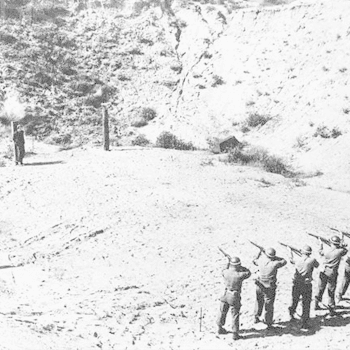
The Firing Squad
April 9, 2014
You are standing in front of a firing squad chained to a pole. The scheduled time for your execution is 20 seconds away. You look down to see a beautiful white rose on the end of a branch from the climbing bush on the wall behind you. It could be within reach if you bend forward a little.
Do you ignore the prepared firing squad and bend forward to smell the sweet scent of nature’s creation? Or are you too petrified with fear, wondering where the barrage of bullets will strike your body?
While this situation is an extreme, during my life I have personally stood wondering on occasions of impending, but inevitable, disaster rather than look for some joy that may be within my grasp.
Surely a clear thinking person would realise that not to take the opportunity to smell the rose, is insane.
Remember I am talking about situations where you have passed the point of no return, not situations where concentrated focus or action may result in a better outcome.
Surely we know all there is?
April 8, 2014
"Surely we know all there is?
"
This comment, slash question came from a friend of mine at a recent dinner party. It was part of a discussion about advances currently being made in science.
The look of surprise on my face was so obvious that before I could express my strong disagreement another diner chimed in with a “yes, we must be close to knowing it all”.
My shock was compounded more because these two friends were educated people and their resolve seemed so strong. After 30 minutes of lively discussion during which I tried to draw their attention to fields of discovery like, origins of the universe, stem cell research, regenerative medicine and computer science to name a few, I could see I was getting no closer to altering their perspective. So to save the dinner party, we agreed to change the subject.
As I was heading home that night I reflect on what had been said, and wondered if perhaps the sheer volume of information available today through the magic of the internet and range of devices we carry which keep us constantly plugged in, was too much.

Stop interrupting me!
April 5, 2014
I cannot stand being interrupted when I’m working. I’ve written before about about the benefits of working from home and one of the main ones is the fact no-one can bail me up for a chat when I need to concentrate.
Now, I’m not saying social interaction at work is a total no no. Some of the best friends I’ve ever made I made at work. And we all need a bit of down time during the working day and office banter is a great way to do that. But there’s a time and a place for it. And that time is not when you’re on deadline for something important and one of your colleagues is up for a deep and meaningful.
Want to get some work done without email interuptus? Turn off Outlook. Too many phone calls? Stop answering them. Although that’s not that hard to do even if you’re in an office, what office-bound folk can never do is stop people coming to their door/cubicle and rabbiting on for hours.
Unless, of course, you’re Norman Ohl. He now runs a business called Jubilant Health, but in a previous incarnation as a boss he had a genius way of stopping people disturbing his work.
What your boss really wants to say to you
April 4, 2014
Norman Ohl, an employer for more than 30 years, refers to his staff as “the paid enemy” – not to their faces of course.
“If there was a common overriding issue with my employees, regardless of the industry I was in at the time, it’s that they leave their brain and care factor at the door when they arrive at work,” he says.
”“ Just because you know someone and think they’re a good woman or a good guy doesn’t mean they’re competent in their job.
“This means you often pay them to stuff up; then you have to pay to fix the stuff-up.
“In a construction company I owned, my eight employees managed to destroy $16,000 worth of equipment in a single week due to five careless acts of negligence and zero care factor!”
Mr Ohl says a good employee who shows initiative is a real find, but unfortunately a rare one.

Trying to Lose Fat? Know the Basic Facts
April 4, 2014
Fats or lipids are energy reserves in our body. While carbohydrates are used as the immediate source of energy, our body cannot store much of these, the little it does, is stored in the form of glycogen. Thus energy is stored in fat cells called adipose tissue for future use. In certain people an excess of fat is stored in the cells which results in excess body mass or in severe cases obesity. This excess body fat can create various health problems in humans.
How Fat Cells are Formed?
When we eat a meal the concentration of the fatty acids increase in blood as a result of our intake of food, the lipase enzyme in fat cells convert them into triglycerides.
The fat cells or adipose tissue store fats as triglycerides. These are balloon like, meaning that they may shrink or expand depending on the amount of triglycerides but do not disappear when people lose weight. The majority of the fat cells are found beneath the skin as subcutaneous fat stored in the areas around the waist, buttock, chest, abdomen, breasts and hips and from a health perspective is not that bad. The fat around organs like kidneys, liver and inside muscles is called visceral fat, is much worse in terms of health consequences.








